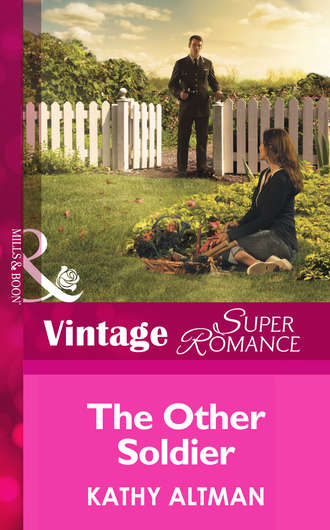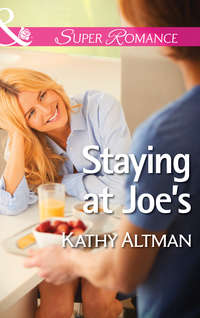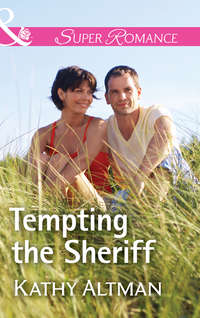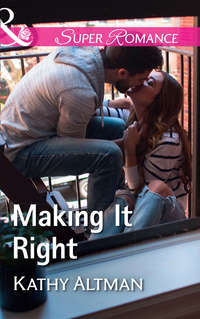
Полная версия
The Other Soldier
“Careful, now. Don’t want to sully that uniform.”
Reid’s fingers tightened in the Lab’s fur and he glanced over at the farmhouse.
Too damned late.
* * *
PARKER’S SHOULDERS ACHED but she didn’t dare ease up on the scrub brush. Best thing in the world for emotional overload? A bucket of warm soapy water, a flat surface and a set of nylon bristles.
Unless there was something in dropkick range. But she couldn’t afford to play soccer with her plants.
Unfortunately the scrubbing thing wasn’t really working, either. She could barely breathe, with all that fury blocking her throat. She’d been doing so well, no longer reminding herself to mail her letter to Tim, or wondering if he was using his sunscreen, or when he’d next get the chance to call home. Keeping it together for Nat—
She sucked in a scalding breath and felt it sear all the way up to her eyeballs. Forgive me, the corporal had said. Now she knew he’d meant for so much more than startling her.
“You’re rubbin’ that worktable like you think a genie’s gonna pop out.”
Parker stopped, stared down at the suds coating the table and slowly relaxed her grip on the brush. Then she whirled and threw the dumb thing at the bucket. The resultant spray of soapy water was nowhere near as satisfying as she’d hoped. She yanked off her lime-green rubber gloves and tossed them after the brush.
“Did he tell you who he was?” She snatched up the hose. “Unbelievable, isn’t it? What made him think he could… Why would he even think I would consider—” She squeezed the nozzle too hard and water jetted off the tabletop and ricocheted back into her face. “Damn it. What I’d like to know is, why is that man even still in the Army?”
Harris took the hose away. “You need to calm down, my girl.” He plucked a handkerchief from his back pocket and held it out. “Nat’s home. Why don’t you go check in with her and I’ll finish up here.”
“I can do it.” She wiped her face, jammed the handkerchief down into her bib pocket and grabbed at the hose. Harris held it out of reach and she frowned. “I can do it. Why don’t you go pester Eugenia?”
He scowled and flushed at the same time. “Don’t you think it’s time you learned to delegate?”
“Don’t you think it’s time you learned I’m in charge?”
He raised an eyebrow. Parker felt a gush of mortified heat sweep up through her chest and into her neck. While she struggled to find the words to apologize, Harris tucked the hose nozzle in the crook of his elbow and took his time unwrapping a stick of gum.
“I’m so sorry,” she said. “I didn’t mean it.”
“I know that, Parker Anne. Anyways, Eugenia and I aren’t datin’ anymore.”
When Harris got that look on his face Parker knew better than to push her luck. She collapsed back against the table, palm to her forehead. What she’d give for a handful of ibuprofen and a caffeinated soda. The last thing she needed to do was alienate her strongest ally. Thanks to Harris Briggs she’d finally come to terms with Tim’s death. And Nat’s nightmares had only just gone on hiatus. Neither of them should have to deal with an in-the-flesh reminder of what they’d lost.
And how they’d lost him.
Thank God she’d sent the corporal away before Nat got home.
“Nat knows to get started on her homework,” she said. “She’ll be fine.”
“She’s bound to have questions.”
She left her hand where it was and talked into her wrist. “About what?”
“About your visitor.”
She launched upright. Oh, no. Oh, God. “She met him?”
“Not met. Saw. And as soon as she saw, she ran.”
Parker’s hands shook. She turned and leaned on the table, palms pressed flat on the soapy surface. “I don’t need this. Nat doesn’t need this. Not now.”
She stared through the plastic sheeting at the row of feathery pine trees that separated the greenhouse from the “garage” that was little more than a leaky barn. “He came a long way for nothing. I don’t have the slightest interest in helping to ease that man’s conscience. If I were in his position I’d never presume to—” Emotion backed up into her throat again.
“The man’s tryin’ to do the right thing.”
Parker turned her head sharply. “You’re defending him?”
“It was an accident. More than a year ago. He wants to apologize. I think, my girl, you should hear him out.”
She shook her head, not believing what she was hearing. “You of all people,” she whispered. “You know what we’ve been through. You’ve seen—” Wait a minute. She turned, and crossed her arms. “I get it. Marines, wasn’t it?”
“That has nothin’ to do with it.”
Oh, please. Then something he’d said finally registered. “What do you mean, he wants to apologize? Isn’t he on his way back to Kentucky?”
Harris’s expression turned mutinous and Parker was tempted to grab the hose and turn it on him. The last time he’d wanted his way, he’d sulked until Parker had given in and ordered a dozen quince trees. Not one had sold.
And she never did get that jelly he’d promised.
He fingered a leaf on a geranium that sported blooms as red as a male cardinal. “He offered to stay. Help out.”
“He what?”
“He wants to make sure you and Nat will be okay.”
“We’ll be a heck of a lot more okay without him around. I couldn’t look at him without thinking of…of Tim.” She gulped, wrapped her arms around her waist and held on tight. “I don’t want him here.”
“He’s a soldier and he deserves your respect. No different from your husband.”
Her body went slack. “It is different. It’s hugely different. Tim never killed anyone.” As soon as the words were out of her mouth she recognized the absurdity. She had no way of knowing what Tim had done in theater. She began to pace, shaking her hands as if she’d burned them. “You know what I mean. If he killed anyone it wasn’t an allied soldier.”
“Probably not. But you don’t know that. If he did, wouldn’t you want him to have the chance to ask for forgiveness?”
She stopped pacing. “He really got to you, didn’t he?” Her fingers dug into her hips. “Where is he, anyway?” So help her, if she found out he was anywhere within even a mile of her property…
Harris carefully set the hose aside. “Listen, my girl. Macfarland may be a soldier, but he’s a man first. A man trying to make amends. Remember that five-year-old boy, run down by a drunk driver a few months back? You said then that you didn’t know how the driver could ever live with himself after being responsible for something like that.”
Parker suddenly had trouble breathing. “Are you actually telling me that if I don’t forgive him he’ll kill himself?”
“All’s I’m sayin’ is, think about the consequences of your actions.”
“Too bad this…corporal…didn’t think about his.” He frowned and she scrubbed her palms on her overalls. “This conversation is over. I don’t want to see that man, I don’t want to talk to him, I don’t want him talking to me.”
“What if he goes back to the desert and gets himself killed? You think you might be sorry you didn’t give him a listen?”
“This is unbelievable. He makes a mistake that costs a man’s life and I’m the one getting the lecture.”
“I’m tired, Parker Anne.”
“Me, too. So let’s drop it. Why don’t you go on up to the house and—”
“I mean, I’m tired. I can’t keep up anymore. For Pete’s sake, I’m old.”
She looked at him then, really looked at him, at his sunbaked skin and disappointed shoulders. She fought the sudden sting of helpless tears.
“You’re not old. But you are right. I work you too hard. I’m sorry, I get so caught up in—” She swallowed. “I’ll figure something out. Get you some help. Why don’t you take it easy for a few days? I’ll handle tomorrow’s delivery.”
“You think I don’t know you can’t afford to hire anyone else right now? And you can’t run this place by yourself. There’s the spring contract orders to fill and more coming in every day. Unless you’ve found the secret to gettin’ by on a few hours’ sleep every day, I don’t see the harm in lettin’ the man help out.”
“I thought I’d made myself clear. That’s not going to happen.”
“It’s for your own good.”
“I think you’re more worried about him than me. Since when did you become so charitable?”
“Since when did you become so selfish?”
Parker stumbled back a step and banged up against the table. Harris looked at her, his eyes sad.
“You need help. He needs to help. Gardening’s therapy. You’re not the only one suffering, my girl.”
“But Nat—”
“Needs to learn not to hightail it every time she sees a man in uniform. She also needs to learn the power of forgiveness. And who’s she gonna learn that from, if not you?”
“I can’t forgive him. You don’t know what you’re asking. Even he knew better than to ask for that.”
“Doesn’t mean he doesn’t want it.” He waited a beat. “All I’m askin’ is for you to try.”
Parker shook her head. “That’s too much. I’m trying to rebuild here. Not just the greenhouses, but our lives. I don’t have time for anything—or anyone—that threatens that.”
Harris didn’t say a word. Not that she’d expected him to. How could he argue with her wanting to put her family first?
CHAPTER TWO
REID SQUINTED THROUGH the windshield. The motel outside Castle Creek looked about as inviting as a trailer park after a tornado. But according to Harris Briggs, it was his only option. Unless he wanted to sleep in the Jeep.
Still, the dingy, mildew-coated structure almost made him homesick for the pitiful piece of real estate he’d been assigned over in southern Afghanistan—which had included room for his bunk and his footlocker, and not much else.
Hell, who was he kidding? He’d been homesick for his unit since stepping off that cargo plane at Godman Army Airfield. Especially after learning he’d been kicked out of Fort Knox housing. New regulations—all unmarried soldiers had to find accommodations off-post. His shoulders tightened, and he rolled them back to shrug off the tension.
He pulled into the motel’s crumbling asphalt lot and parked in front of a battered metal post turned golden by the afternoon sun. The pole supported a newly made sign that read Sleep at Joe’s.
Clever. And just the kind of place he didn’t need. Odds were that behind the registration desk lurked an attention-starved, big-haired woman who would set aside her latest diet bible and siphon Reid for information like she was a ’78 Lincoln and he was the last gas pump for five hundred miles.
The backseat of the Jeep was looking better every second.
Then he thought about his unit over in the sandbox, and how during missions they had to sleep in trenches dug for protection from mortar fire. What did he have to complain about? He got out of the Jeep, stepped over a cluster of wilting daffodils and entered the office.
The clerk manning the desk was just that—a man. Despite his stubbly jaw and frayed jeans and T, he didn’t seem the casual-conversation type. And the book he set aside when Reid walked in had nothing to do with weight loss—it was bulky, yellow and full of telephone numbers.
The clerk gave Reid and his uniform the once-over and leaned forward, elbows on the counter. “Need directions?”
The man’s eyes held respect. Reid lowered his own gaze and pulled his wallet from a back pocket. “Only to an available room.” He slid a credit card across the counter. The clerk didn’t even glance at it.
“Sorry, man. Not open for business yet.”
Damn. “Any recommendations?”
“There’s a Motel 6 twenty-five miles east.”
“Thanks.” The phone trilled and the man nodded, then turned away. Reid was at the door when he called after him. “Not one to ask for favors, are you?”
Slowly Reid turned. “Meaning?”
“That was Harris Briggs on the phone. Said he’d told you to mention his name.” The clerk shrugged. “I have a room that’s clean but postapocalyptic ugly. I just bought the place. The reno’s barely started.”
“I can handle a lot of ugly.”
Another survey of his uniform. “Bet you can.” The clerk pushed across a registration form. “Staying long?”
“No idea.”
“Just keep me posted.”
Reid signed the form and offered his hand. “Reid Macfarland.”
“Joe Gallahan.” He held out a key card. “Room six. Questions?”
“Yeah. Where can I get something to eat?”
An hour later, on the toaster-size TV—hell, a laptop could have gotten a better picture—James Coburn demonstrated his prowess with a knife in The Magnificent Seven while Reid eyed the remains of a pepperoni pizza that had looked a lot better than it tasted. He’d wanted to do better than fast food, but he hadn’t had the energy to take Gallahan’s advice and get something to eat in the next town.
Of course if he had, he’d have missed soaking in the atmosphere of Castle Creek’s only motel. He looked around with a grimace. The place must have been sitting empty for years. Considering what kinds of creatures had probably been hanging out rent-free, he probably shouldn’t be making jokes.
Probably shouldn’t be breathing without a mask, either.
Gallahan had one hell of a job ahead of him.
If the motel’s exterior, with its lime-green paint, scraggly landscaping and crevice-ridden concrete qualified as a horror flick, then the interior had to be every Michael-Myers-on-Halloween-night movie ever made spliced into one gory, never-ending saga.
The cheap paneling on the walls bore twice as many scars as the plastic covering Parker Dean’s greenhouses. Cigarette burns decorated the dresser, the table and the nightstand. He suspected that the carpet, which had been repaired many times over with duct tape, hadn’t started out that muddy-brown color. And someone had painted the ceiling turquoise, presumably to cover up water stains. Reid muttered a quick prayer that it didn’t rain.
But despite the less-than-lovely interior, the room was clean, just as Gallahan had promised. Not a speck of dust in sight. Someone had worshipped the bathroom with a scrub brush, and the fresh scent of lemon lingered just beneath the smell of tomato sauce.
He let the slice of pizza fall back into the box and found himself wondering what kind of meal Parker Dean and her daughter were sitting down to. Something healthy and hearty, no doubt. Like roast beef and mashed potatoes. Or spaghetti with meatballs. He frowned at the grease-laden pizza and closed the lid.
Then again, maybe she didn’t have time to cook, since she was a single parent. Thanks to him.
He grabbed the TV remote and stabbed at the power button. Wondered for the hundredth time if he’d done the right thing, coming to Castle Creek.
No way Harris Briggs would be able to talk Mrs. Dean into letting him help out. And even if he did, was it fair of Reid to do so? What the hell had he been thinking, expecting a grieving family to accommodate the man responsible for their grieving in the first place?
Money was the kinder option. Before he took off in the morning, he’d leave a check with Gallahan.
He finally recognized a far-too-cheerful chirping as his cell phone. The screen displayed an unfamiliar number and for a second or two his lungs went AWOL. Had Harris Briggs managed the impossible?
“That you, Corporal?”
“Mr. Briggs.”
A pause. “I’d tell you to call me Harris but I doubt we’ll be usin’ each other’s names much.”
Right. “She said no.”
“That’s puttin’ it mildly.” Reid snorted softly. Harris Briggs cleared his throat. “Was a pleasure to meet you, son. We appreciate what you boys are doin’ over there.”
Reid thanked him and ended the call. So that was that.
Son. He sat back and mentally sifted through years of memories, scrambled to single out the one where his father had last called him “son.” Couldn’t find it. And suddenly, desperately, he needed it.
A quick, disgusted shake of his head. Enough with the self-pity.
He should be relieved. Should be grateful he didn’t have to spend his leave trying to fix something destined to remain forever broken. He’d tried. And failed. He’d write that check, and when the loan came through he’d write a bigger one. One that would require years of monthly payments.
So why did he feel like he was getting off easy?
No doubt Parker Dean would agree. His mouth relaxed as he pictured her. She’d looked like she’d been digging an underground tunnel to Canada. She’d worn a sweat-soaked T under an oversize pair of mud-streaked overalls. Dirt marked both cheeks and flecked the cinnamon hair gathered at the back of her head. But despite all that mud he’d registered creamy skin, a curvy figure and eyes that promised sincerity and humor.
And once she’d found out who he was, she hadn’t hesitated to tell him to go pound sand.
Tim Dean had been a lucky man. Too bad Reid had no business thinking of Parker Dean as anything other than someone he owed a hellacious obligation to.
Out of the corner of his eye he spotted movement. The stealthy, scampering, wall-hugging movement of a mouse. Squatters. Terrific. They’d have to go. He hadn’t signed on for roommates. Not even for one night.
He stood and reached for the phone, intent on petitioning Gallahan for a few traps. A glance at the corner where the mouse had disappeared and he hesitated, let his hand slide off the receiver.
For fifteen months he and thirty other guys had tolerated a family of sand rats in their tent. Certainly he could handle a mouse or two.
Live and let live, and all that.
He collapsed onto the bed, and threw an arm across his face so he wouldn’t see the room start to blur.
* * *
PARKER CREPT DOWN THE hallway past her daughter’s bedroom. Thank goodness for the night-lights Nat had insisted on when they’d moved in. Their eerie green glow helped her reach the attic without breaking a toe. She eased the seldom-used door open, flipped on the light switch and pulled the door shut behind her.
She shivered and hesitated on the bottom step. A short-sleeved T and flannel pajama bottoms were no match for the attic chill. Why hadn’t she thought to grab a sweater? She grunted. Forget the sweater. It was the middle of the night. Why hadn’t she stayed in bed, instead of baking muffins and playing safari in her own attic?
She wrapped her arms around her waist and peered up the worn, narrow flight of stairs. But it wasn’t the cold or the cobwebs draped along the walls that rooted her in place. She hadn’t ventured up there since she’d tucked Tim’s things away a year ago.
Don’t be such a baby.
She took in a breath, then another, and started to climb. The air smelled thickly of dust, faintly of machine oil and faded roses. But the way her stomach was rebelling, anyone would think a family of skunks had moved in.
Five steps up she snagged a sock on a nail head. She yanked her foot free and kept going. She’d have to come back with a hammer.
If only all of her problems could be solved so easily.
Half an hour later, sitting cross-legged on a comforter she’d scavenged from a cardboard box, she thumbed through the last of the seven photo albums stacked at her hip. She’d had the sudden urge to look through them all—the pictures of her college days in Blacksburg, Virginia, where she’d met Tim; their wedding photos; their first home on post at Fort Bragg in North Carolina; Nat’s birth and progression from toddler to second-grader.
Parker closed the album. So many blank pages.
Nat was now in third grade. They’d stopped taking pictures after Tim died.
Guilt settled in. The final picture in the album was one Tim had taken of Nat. She stood beside their car in sneakers and a pink-and-purple-striped bathing suit, her hair in pigtails, her face tearstained and tragic. In her left hand she held what was left of Tim’s favorite fishing pole. She’d slammed the car door on it, shearing off the tip. Tim had spent thirty seconds raging, five minutes mourning, and three days laughing. Since Nat already had her swimsuit on he’d taken her to the water park, to show there were no hard feelings.
Her husband had been a forgiving person. Unlike his family.
Parker’s parents had been in their late forties when she was born, and neither her mother nor her father had lived past seventy-five. Which meant that Tim’s mother and brother were the only other family Nat had. But they were family in name only. They hadn’t spoken to Parker since the falling-out at Tim’s funeral. No one would ever describe them as forbearing.
She should be grateful. If not for that she might have backed out of buying this property. She and Nat would never have moved to Castle Creek. Would never have realized Tim’s dream.
And anyway, who was Parker to judge? She hadn’t contacted Tim’s family, either. Of course, she had no illusions about herself. Forgiveness was beyond her.
Her eyes filled. She hugged herself and began to rock. I can’t do it, Tim. I can’t forgive him for taking you away.
The door at the bottom of the stairs squeaked a warning. Parker barely managed to dry her face with the hem of her T before her daughter’s head poked up out of the stairwell. Her hair was flat on one side and tousled on the other and she was knuckling the sleep from her left eye. A series of thumps and some heavy breathing signaled Chance was close behind her.
“Mom?” Nat yawned. “Something’s burning.”
Oh, God. “The muffins!”
The album slid to the floor with a muffled whump as Parker scrambled to her feet. That’s what she got for indulging in a one-woman pity party. She hustled down the stairs behind Chance, whose tail wagged with delight at this new game. Parker’s foot caught the nail again and this time she left her sock behind. When she hit the first floor the smell of scorched batter was unmistakable. By the time Nat reached the kitchen Parker had pulled the pans out of the oven and both she and Chance were staring at the shriveled, blackened remnants.
All those ingredients, wasted. She sighed and dropped the potholders onto the counter. “Not even Chance would go for these.” He barked once, and plopped down onto the braided rug. Parker made a face. “Didn’t think so.”
Nat peered over her shoulder. “Isn’t charcoal supposed to make you hurl?”
“If you can get past the smell long enough to actually take a bite, then yes, I think it’s a given you’ll puke. And speaking of smell…” Parker heaved open the kitchen window. When she turned back around Nat sat hunched over the kitchen table, chin propped in both hands.
“Hot chocolate?”
Nat nodded, then bit her lower lip. “He made you sad, didn’t he?”
“Chance?”
“That soldier.”
Parker paused, the two mugs she’d selected from the tree on the counter poised in midair. “What makes you think I’m sad?”
“Mom. Why else get up in the middle of the night to bake muffins?”
“Maybe I was hungry.”
Nat rolled her eyes. “You were hanging out in the attic. With a bunch of photo albums. If you were hungry you wouldn’t have let the muffins burn.”
Busted. Parker set a container of water in the microwave to heat and sat next to her daughter. “All right. Yes, he made me sad. I miss your father, and I know you miss him, too. Seeing someone wear the uniform Daddy used to wear…that was tough.” She paused. She’d tried to ask Nat about it earlier, but the little girl had first clamped her lips tight and then, when Parker had gently persisted, she’d scuttled up to her room. Now Parker tried again.
“Harris said you saw him, too. Did it make you sad?”
Nat hung her head. She swallowed, and the sound was loud in the midnight kitchen. Parker reached out and tucked Nat’s soft auburn hair behind her ear. “Want to talk about it?”
She mumbled something and sniffled. Parker waited, and was about to ask again when suddenly Nat raised her head, and Parker’s heart ached at the hurt in her daughter’s eyes. “At first I was so h-happy,” Nat whispered. “I thought it was Daddy. I mean, I knew it couldn’t be, but then I thought maybe it was a mistake after all, that the bomb had missed him and they couldn’t find him but then they did and he wanted to surprise us and—” Her chin trembled, and she swiped at her nose with the heel of her hand. “Then I saw it wasn’t him and I ran away because…Daddy always told me to be a little soldier and…and…and I didn’t want his friend to see me cry.” She squeaked out the last few words and broke into sobs.






